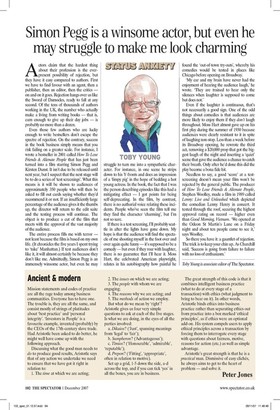Ancient & modern
Mission statements and codes of practice are all the rage today among business communities. Everyone has to have one. The trouble is, they are all the same, and consist mostly of strings of platitudes about 'best practice' and 'personal integrity'. 'Investors in People' is a favourite example, invented (probably) by the CEOs of the 17th-century slave trade. Had Aristotle been asked to do better, he might well have come up with the following approach.
Discussing what the good man needs to do to produce good results, Aristotle says that of any action we undertake we need to ensure that we have got it right in relation to: 1. The time at which we are acting; 2. The issues on which we are acting; 3. The people with whom we are engaging; 4. The reasons why we are acting; and 5. The methods of action we employ.
But what do we mean by 'right'? Aristotle gives us four very simple questions to ask at each of the five stages. Is what we are doing, in the eyes of all the parties involved: a. Dikaios? (Just', spanning meanings from 'legal' to lair'); b. Sumpheron? (Advantageous'); c. Timios? (Honourable', 'admirable', 'reputable'); d. Prepon? (Fitting', 'appropriate', often in relation to motive).
Set up a grid, 1-5 down the side, a-d across the top, and if you can tick 'yes' in all the boxes, you are in business.
The great strength of this code is that it combines intelligent business practice (what to do at every stage of a transaction) with ethics (what judgment to bring to bear on it). In other words, Aristotle binds ethics into business practice rather than separating ethics out from practice into a box marked 'ethical principles', as if ethics were an optional add-on. His system compels users to apply ethical principles across a transaction by forcing them to interrogate every stage with questions about fairness, motive, reasons for action (etc.) as well as simple advantage.
Aristotle's great strength is that he is a practical man. Dismissive of easy clichés, he always aims to get to the heart of problem — and solve it.
Peter Jones





































































 Previous page
Previous page